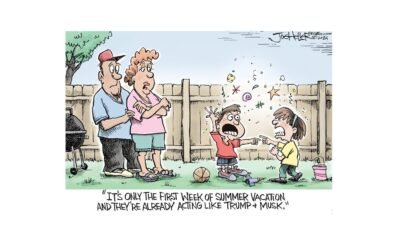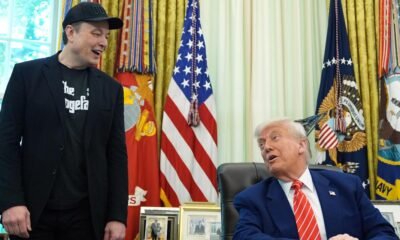Business
Trump Stands Firm on Tariffs, Declares Them ‘Medicine’ Amid Market Turmoil

FORT LAUDERDALE, Fla. — President Donald Trump reaffirmed his commitment to imposing tariffs on global imports on Sunday, stating that he won’t reconsider his decision unless trading balances improve with the U.S. This stance comes amidst significant declines in financial markets, raising recession concerns and instability in international trade.
While addressing reporters aboard Air Force One, Trump expressed uncertainty about the impending financial fallout but remained unapologetic about his tariff strategy. He remarked, “I don’t want global markets to fall, but sometimes you have to take medicine to fix something.” His administration has faced challenges from financial markets that appear poised for further declines when trading resumes.
In an effort to mitigate market anxiety, White House aides highlighted that over 50 countries have approached the U.S. to initiate discussions regarding the tariffs. Trump noted, “They’re dying to make a deal,” while maintaining that trade deficits are unacceptable, considering them equivalent to loss.
The new tariffs are set to take effect Wednesday, marking a significant shift in economic policy. Treasury Secretary Scott Bessent indicated that resolving unfair trade practices requires more time than quick negotiations, emphasizing the need for concrete offers from other nations.
Despite recent turmoil, Trump remains optimistic, asserting on social media, “WE WILL WIN. HANG TOUGH, it won’t be easy.” Meanwhile, his administration continues to downplay the potential negative consequences of the tariffs on the global economy.
Market responses have been harsh, with U.S. stock futures tumbling—S&P 500 futures fell 2.5%, and Dow futures dropped 2.1%. Notably, Asian markets mirrored this trend, highlighted by Tokyo’s Nikkei 225 index plummeting nearly 8% upon opening. Chinese markets also faced significant losses.
China and other nations have promptly retaliated against Trump’s newfound tariffs, which were unveiled on April 2 as part of his campaign strategy to redefine global trade dynamics. Trump is banking on American voters accepting potential price increases for everyday goods as part of his economic vision.
Countries like Vietnam and Israel have expressed their apprehensions regarding the tariffs. Israeli Prime Minister Benjamin Netanyahu is scheduled for talks with Trump, where tariffs will be a key discussion point. Vietnam’s leader indicated a desire to reduce tariffs to zero if an agreement can be reached with the U.S.
As the situation develops, the administration is resolute in moving forward with the tariffs, and Commerce Secretary Howard Lutnick confirmed that there will be no delays in their implementation.
In Congress, the response has been mixed. While some Republican senators express support for Trump’s actions, many are uneasy about the economic implications. A bipartisan bill has emerged, requiring presidents to justify new tariffs—a move indicating growing tension within Trump’s party regarding the administration’s direction.
Senate GOP leadership member John Barrasso commented on the mixed reception, acknowledging both support and concern within the country regarding market impacts. Discussions about potential legislation continue as lawmakers monitor market reactions closely.
Elon Musk’s recent call for lower tariffs gained criticism from White House trade adviser Peter Navarro, who framed Musk’s position as self-serving. Trump, disagreeing with Musk, emphasized that any negotiations with the European Union must come at a cost to them.
Officials continue to provide varying perspectives on the economic strategy. While some advocate for negotiation with trade partners aimed at reducing tariffs, others argue that maintaining higher tariffs is essential for long-term revenue and business relocation.
This situation is evolving, and the ramifications of Trump’s tariff policy will undoubtedly influence both domestic and international economic landscapes moving forward.
Gomez Licon reported from Fort Lauderdale, Florida. Associated Press writer Giada Zampano contributed to this report.


















